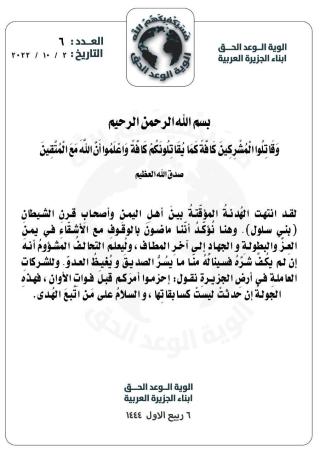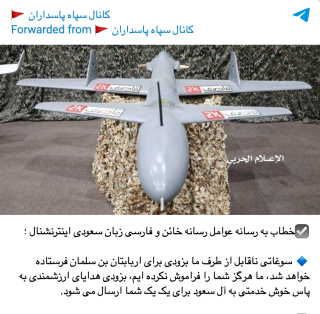
Iraqi Militia Group Makes Credible New Threat Against the Gulf States

The facade group in question tends to follow through on its warnings, so its latest rhetoric about using developments in Yemen as cause for new attacks should be taken seriously.
On October 2, the Iraqi muqawama (resistance) facade group Alwiyat al-Waad al-Haq (AWH) issued a statement threatening to attack “companies that work on the [Arabian] Peninsula.” The statement reads: “The temporary truce between the people of Yemen and [Saudi Arabia] has ended. We confirm that we are going to stand with the brothers in Yemen in glory, heroism, and jihad to the end. Let the ill-fated alliance know that if its wickedness does not stop, it will receive from us what pleases the friend and enrages the enemy. As for companies operating in the land of the Jazira [the Arabian Peninsula] we say: make up your mind before it is too late; this round, if it happens, is not going to be like the previous ones” (Figure 1). The statement is especially significant because AWH had been dormant since January, when it claimed a drone attack against the United Arab Emirates.
The warning also appeared on the same day as a similar threat made by Houthi military spokesman Yahya Saree, who tweeted, “The armed forces give the oil companies operating in the UAE and Saudi Arabia an opportunity to arrange their status and leave as long as the countries of the American-Saudi aggression are not committed to a truce that gives the Yemeni people the right to exploit their oil wealth for the benefit of the salary of Yemeni state employees” (Figure 2). The two-month truce in Yemen expired on October 2 after the Houthis refused to renew it, probably in the hope of building enough leverage to compel the UN-backed Yemeni government to provide salaries for employees in Houthi areas.
The AWH threats may serve a broader purpose beyond Yemen. Social media channels affiliated with Iran's Islamic Revolutionary Guard Corps (IRGC) have recently been threatening Saudi Arabia, claiming that the kingdom is playing a role in Iran's ongoing domestic unrest. In particular, they blame the London-based Saudi-linked television network Iran International for fanning the protests.
Also on October 2, the IRGC-affiliated Sepah Pasdaran Channel on Telegram posted a threatening message to Saudi Arabia: “To the agents of the traitorous Farsi-language media Saudi International [the Iranian regime's name for Iran International): a small souvenir will soon be sent to your lord [Saudi crown prince Muhammad] bin Salman.” The post included an image of a Qasef-2K, a type of drone launched mostly from Yemen but recently from southern Iraq for the first time as well (on August 12). The message also seemed to threaten the journalistic staff of Iran International: “We have never forgotten you; soon valuable gifts will be sent to each one of you for your good service to [the House of Saud]” (Figure 3).
The IRGC-affiliated Iranian Sabrin News (not to be mistaken with the Iraqi Sabereen News) published a similar threat, including the same Qasef-2K image: “Soon, a small souvenir will be sent from Iran to bin Salman. We will never forget the role of al-Saud in the recent disturbances. Soon we will present valuable gifts to al-Saud for these actions" (Figure 4).
The AWH threat—and broader warnings of attacks on the Gulf states—should be taken seriously for two reasons. First, Iran is under huge pressure internally and no doubt feels the need to redirect that pressure externally. The recent heavy bombardment of positions held by Iranian Kurdish opposition parties in Iraqi Kurdistan is a testament to that. The Islamic Republic wants to point to external parties as the cause of the protests back home.
Second, AWH has a very credible track record regarding such threats. On the two past occasions when this facade was activated, drones have been launched from Iraq toward the Gulf states: first against Riyadh in 2021, and then against Abu Dhabi earlier this year. The August launch of a Qasef-2K from Iraq toward Kuwait indicates a buildup of intent regarding Gulf strikes as well as the introduction of the Qasef-2K to the Iraqi environment.









